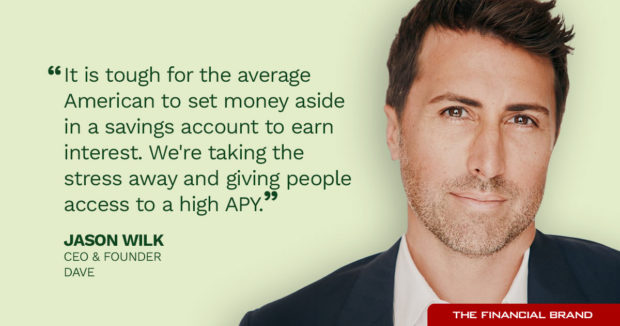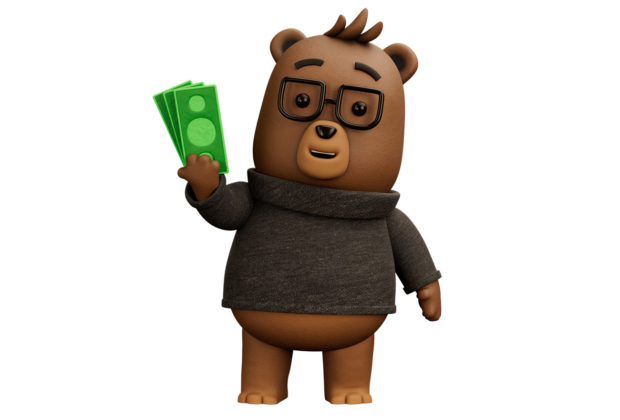One of the goals of neobanks is achieving the status of “primacy” — that is, having the main banking account of its customers.
It’s been an elusive quest. Many consumers open second accounts with fintechs while keeping their main account with a traditional bank or credit union, research has shown.
But that’s starting to change. Recent research suggests that as Millennials and Gen Z become the dominant share of account holders, more neobanks and fintechs will enjoy primary relationship status.
What could tip the scale even more drastically? Money.
Dave, a mobile banking app intended for people who live paycheck to paycheck, has doubled down on making its deposit accounts more attractive. It aims to increase the likelihood of becoming the primary banking provider of its users — Dave calls them “members” — and improve their ability to build savings.

Navigating the Role of AI in Financial Institutions
83% of FI leaders agree investing in AI is essential for 2024 but how you leverage AI is instrumental in success and meeting customer expectations.
Read More about Navigating the Role of AI in Financial Institutions

Move the Needle from Attrition to Acquisition
Vericast’s 2024 Financial TrendWatch explores seven of today’s most critical financial services trends to provide a complete view of the current loyalty landscape.
Read More about Move the Needle from Attrition to Acquisition
How Paying Higher Interest Fits into Dave’s Strategy
The fintech, which charges users $1 a month, started paying a 4% APY on both its checking and savings accounts as of Aug. 1. The higher rate is being paid on all of its accounts indefinitely, including existing accounts. It is neither a limited-time offer nor a new-money-only deal.
“It is tough for the average American to set money aside in a savings account to earn interest,” says Jason Wilk, the founder and chief executive of Dave. “It can lead to overdraft fees in your checking account if you didn’t keep the right amount of money in it. We’re taking the stress away and giving people access to a high APY on both accounts.”
Wilk expects the move to help Dave stand out from competitors. “This is a real step up that no other neobank that serves our type of customer is doing,” he says.
Dave launched in 2017 with a central selling point of helping the paycheck-to-paycheck segment avoid overdraft fees. Members can obtain fee-free cash advances of up to $500 from Dave if they need extra money to tide them over until the next paycheck. It gets repaid when that paycheck arrives in the account. The service, called “ExtraCash,” is typically used for essentials like gas and groceries.
Wilk says the decision to pay 4% APY on all accounts is another way to demonstrate Dave’s goal of leveling the playing field for its target audience.
Dave’s membership increased by 739,000 people in the second quarter of 2023, up 5% from the 702,000 increase seen in the second quarter a year earlier.
Wilk declines to say what the average balance is for its accounts. He also declines to share what portion of Dave members consider the neobank to be their main financial provider. “We don’t disclose that today, but it’s a pretty significant amount of customers and growing every month,” he says. “It’s a major strategic focus for the company.”
Dave considers megabanks to be its main competition among traditional institutions and, among neobanks, it considers Chime to be number one.
Dave is planning to expand its offerings, with options more like those available to higher-income consumers. “Hopefully, in the not too distant future, we can help bring other products to our members that they can graduate into and go up the credit spectrum,” Wilk says.
High on the list is anything that would make the neobank more likely to attract direct deposits, he says. The details are still under discussion, so he would not be more specific.
But, he says, CDs are not on the radar because Dave’s members need the liquidity of the Spending and Goals accounts and aren’t in a position to lock up their funds. (The neobank’s version of checking is called “Dave Spending” and its version of savings is called “Dave Goals.”)
Dave provides its accounts through a banking-as-a-service relationship with Evolve Bank & Trust in Memphis, Tenn.
Read more: Are You Fighting Yesterday’s Checking Account War Instead of Today’s?
Marketing Expenses Shrink as Target Audience Expands
Inflation is causing the segment that Dave serves to grow. The total addressable market of financially challenged Americans grew 6% in 2022, to 176 million people, according to Financial Health Network statistics.
In recent quarters, a key goal at Dave has been to cut back on marketing while still adding users. This is common among neobanks and fintechs, all of which are under pressure to show profitability in a market where capital has become much harder to find.
Dave spent 28% less on marketing year-over-year in the second quarter. Its overall customer acquisition costs dropped by almost a third for the same period.
Still, the second-quarter marketing expense included some longer-term investments, such as a refreshed website and branding. For example, Dave’s mascot — a bear — now has a three-dimensional look, as shown below.
In addition, new TV and radio advertisements were produced that did not start airing until the third quarter had begun.
Wilk says some optimizing of channels has helped with expense control. The neobank has found it gets a good payoff from using broadcast television and radio along with streaming television.
Some options — like digital advertising — have gotten cheaper because competitive conditions have changed, Wilk adds. When cryptocurrency was still hot, advertisers in that sector typically drove up pricing for digital inventory, because those fees rise and fall based on demand. Now digital costs have come down for the categories that financial companies generally bid for.
The drop in venture capital funding for fintechs also has meant less fuel for advertising, which is another factor that has helped bring pricing down, according to Wilk.
Wilk also credits Dave’s value proposition with helping drive demand, despite the fact that it has cut back on its own marketing. “A free checking account that comes with ‘ExtraCash’ is so much better than overdraft service,” he says.
Read more about fintech competitors:
- Upgrade Expands Credit Card, Loan Lineup for Wider ‘Mainstream’ Appeal
- SoFi Has Big Plans for the $2B of Deposits It’s Scooping Up Every Quarter
- Green Dot Goes All-In on GO2bank Mobile App with Major Marketing Effort

Dave Expects to Return to Profitability in 2024
Regulators have increased scrutiny of the banking-as-a-service model and are sometimes thought of as not looking kindly on financial innovation in general.
But Wilk thinks Dave’s approach to credit evaluation has found some favor.
To determine how much ExtraCash its members qualify for, Dave uses artificial intelligence to analyze their transaction history. It does this across the bank accounts that consumers link to their Dave relationships. Wilk describes this as a predictive cash-flow analysis. The neobank doesn’t rely on FICO evaluation at all, which he views as old-fashioned.
Wilk says that the Consumer Financial Protection Bureau endorsed the cash-flow approach in general terms in a July blog post titled, “Looking at credit scores only tells part of the story — cash-flow data may tell another part.” Wilk says he considers Dave to be a pioneer in this area.
“I think as long as you stay within the confines of the regulations, there are still a lot of things you can do to move the needle for the customer,” he says.
Wilk told investors last year that Dave would return to profitability in 2024 without needing to raise further equity capital. He says he remains confident that that will happen. And he points to a vote of confidence in the form of Imran Khan acquiring a 2.5% stake in Dave via secondary sale in early August. Khan also joined Dave’s board.
A tech exec and entrepreneur, Khan played a key role in the initial public offerings of Snap and Alibaba. In a statement, he said he was impressed with Dave and hoped to help it realize its full potential.
See The Financial Brand’s Neobank Tracker:









